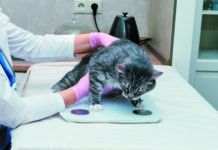© Jdgrant | Dreamstime


Thanks to a clinical trial partly funded by the Morris Animal Foundation, there is an important veterinary breakthrough: Cats with FIP went into remission following treatment with a specific antiviral drug.
Sadly, this fatal viral disease has historically had neither effective treatment nor cure. Diagnosis of it can be difficult, as well. But researchers from Kansas State University and the University of California-Davis recently published their findings in theFeline Medicine & Surgery, and now there is new hope within the veterinary community.
One study — launched in March 2016 by Dr. Yunjeong Kim at Kansas State Univeresity and Dr. Niels Pedersen at the University of California-Davis — was a limited clinical trial to see whether a novel antiviral drug could cure or extend the life span and quality of life for cats diagnosed with FIP.
“This research is the first attempt to use modern antiviral strategies to cure a fatal, systemic viral disease of any veterinary species,” said Dr. Pedersen. “Our task was to identify the best candidates for antiviral treatment, and also the best dose and duration of treatment. Savings or improving the lives of even a few cats is a huge win for FIP research.”
The team conducted a clinical trial with 20 cats with various forms and stages of FIP. At the time of the study’s publication, seven cats were still in disease remission, considered a positive step forward for a historically untreatable disease.
“We found that most cats, except for those with neurological disease, can be put into clinical remission quickly with antiviral treatment – but achieving long-term remission is challenging with chronic cases. These findings give us more insight into FIP pathogenesis and also underscore the importance of early diagnosis and early treatment,” said Dr. Kim.
FIP is caused by a mutated coronavirus, and usually targets kittens and cats under two years of age. Cats that live in close proximity — such as shelters, where FIP is 5 to 10 times more prevalent — are at highest risk. FIP is challenging to diagnose because its early symptoms can resemble other diseases. While there are currently supportive treatments if detected early, FIP is 100 percent fatal.
The new drug needs to be commercialized first, which is a complex process that requires a company to take the drug through FDA approval and licensing, according to the Morris Foundation. This important step could take several years before the drug is approved and made available for use by licensed veterinarians.




